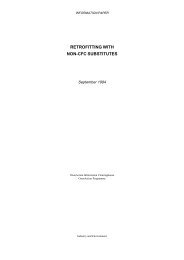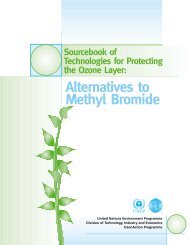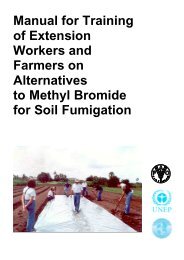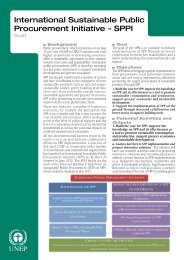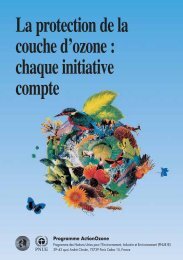industry and environment - DTIE
industry and environment - DTIE
industry and environment - DTIE
You also want an ePaper? Increase the reach of your titles
YUMPU automatically turns print PDFs into web optimized ePapers that Google loves.
Chemicals management<br />
◆ supporting citizens who need assistance in dealing<br />
with problems arising from the use of chemicals;<br />
◆ promoting <strong>environment</strong>al issues for the benefit<br />
of all citizens;<br />
◆ disseminating to the general public information<br />
that has been made available by the government<br />
<strong>and</strong> the <strong>industry</strong> sector;<br />
◆ informing <strong>industry</strong> <strong>and</strong> government about any<br />
issues of concern to the general public.<br />
Since the WSSD, South Africa’s Chemical <strong>and</strong><br />
Allied Industries’ Association (CAIA) 17 has developed<br />
a strategy for extending Responsible Care<br />
along the value chain in response to some of the<br />
priorities identified above. A study is also being<br />
conducted to ensure that training activities are<br />
developed within the national skills development<br />
strategy. This strategy requires the development<br />
of sector skills plans for five-year periods. A review<br />
of training needs in chemical management is currently<br />
being undertaken to ensure that the<br />
required elements are included in the chemical<br />
sector skills plan for the period 2005-09 being<br />
developed.<br />
Meeting stakeholder expectations:<br />
Responsible Care<br />
The international Responsible Care initiative 18 is<br />
the global <strong>industry</strong>’s commitment to continuous<br />
improvement in safety, health <strong>and</strong> <strong>environment</strong>al<br />
performance. It was adopted in South Africa in<br />
1994. Although implementation of this initiative<br />
in South Africa has contributed to the improvement<br />
of chemical <strong>industry</strong> performance in this<br />
area, the <strong>industry</strong> has acknowledged that much<br />
still remains to be done.<br />
The chemical <strong>industry</strong> recognizes its potential<br />
impacts on the <strong>environment</strong>, particularly on<br />
resource utilization. The Responsible Care initiative<br />
is implemented in South Africa through seven<br />
Management Practice St<strong>and</strong>ards, covering:<br />
◆ Health <strong>and</strong> Safety;<br />
◆ Storage, Distribution <strong>and</strong> Transport;<br />
◆ Pollution Prevention <strong>and</strong> Resource Efficiency;<br />
◆ Community Interaction;<br />
◆ Emergency Response;<br />
◆ Product Stewardship <strong>and</strong> Process Safety.<br />
Implementation of these st<strong>and</strong>ards is evaluated<br />
every two years. Quantitative Indicators of Performance<br />
are collected annually. An annual award<br />
is made to the company that has shown the most<br />
improvement in respect of these indicators.<br />
The initiative provides a sound platform not<br />
only for improving compliance with <strong>environment</strong>al<br />
<strong>and</strong> health <strong>and</strong> safety legislation, but also<br />
for encouraging continuous improvement in performance<br />
beyond mere legal compliance. In the<br />
absence of comprehensive national legislation in<br />
the area of safety, health <strong>and</strong> the <strong>environment</strong>,<br />
Responsible Care provides a framework within<br />
which multinational companies can operate to the<br />
same st<strong>and</strong>ards as in their country of origin.<br />
Poor safety, health <strong>and</strong> <strong>environment</strong>al practices<br />
cost more in the long term than introducing<br />
sound chemical management practices. One of<br />
the major challenges facing <strong>industry</strong> in many<br />
developing countries is how to operate plants at<br />
an appropriate st<strong>and</strong>ard without the support of a<br />
national framework. Market access issues increasingly<br />
include social <strong>and</strong> <strong>environment</strong>al considerations.<br />
The ICCA report on the chemical <strong>industry</strong>’s<br />
contribution to sustainable development, prepared<br />
for the WSSD under the auspices of UNEP,<br />
recognized the need to meet increasing dem<strong>and</strong><br />
from stakeholders for Responsible Care to address<br />
stakeholders’ key areas of concern. 19<br />
To address this issue, the South African chemical<br />
<strong>industry</strong> undertook the development of a strategy<br />
to extend Responsible Care along the value<br />
chain.<br />
The strategy was developed by assessing current<br />
chemical management practices. Information was<br />
collected through a process of interviewing key<br />
organizations <strong>and</strong>/or associations that represent<br />
the different stages in a chemical life cycle (i.e. raw<br />
material supply, primary chemical manufacture,<br />
secondary chemical manufacture, import/export,<br />
consumption/end-user, transportation, waste<br />
management). The chemical management instruments<br />
currently in use include:<br />
◆ safety, health <strong>and</strong> <strong>environment</strong>al management;<br />
◆ risk assessment;<br />
◆ supplier-user agreements;<br />
◆ provision of information <strong>and</strong> guidance for users;<br />
◆ information management;<br />
◆ development of safer products <strong>and</strong> processes;<br />
◆ incident management;<br />
◆ performance monitoring <strong>and</strong> review;<br />
◆ import/export procedures;<br />
◆ training <strong>and</strong> awareness raising;<br />
◆ safe disposal of waste.<br />
The results of the investigation confirmed that,<br />
to a greater or lesser extent, sound chemical management<br />
practices are generally in place for raw<br />
material suppliers, primary <strong>and</strong> secondary chemical<br />
manufacturers, <strong>and</strong> importers <strong>and</strong> exporters. However,<br />
these practices at best extend to downstream<br />
entities by only one link in the chemical chain.<br />
The needs of consumers (the end-users of<br />
chemical products) <strong>and</strong> service providers (e.g.<br />
waste management firms <strong>and</strong> road hauliers) were<br />
identified by interviewing representatives in those<br />
areas. This group identified a range of priorities to<br />
help them manage chemicals more safely <strong>and</strong><br />
increase their confidence in the chemical <strong>industry</strong>.<br />
These include:<br />
◆ independent verification of the implementation<br />
of the Responsible Care initiative;<br />
◆ a st<strong>and</strong>ardized approach to provision of hazard<br />
information;<br />
◆ consistent use of chemical terminology;<br />
◆ the need for a life-cycle approach;<br />
◆ uniform procedures for h<strong>and</strong>ling of chemicals;<br />
◆ training of users <strong>and</strong> awareness raising,<br />
◆ improved comprehensibility of hazard information.<br />
A strategy has been developed to improve<br />
implementation of Responsible Care in South<br />
Africa to address these issues. It includes the following<br />
elements:<br />
◆ independent verification of implementation of<br />
Responsible Care;<br />
◆ targeted marketing campaigns to raise awareness<br />
of the benefits of using Responsible Care companies<br />
as chemical suppliers <strong>and</strong> as service providers<br />
to the chemical <strong>industry</strong>;<br />
◆ assistance to smaller companies in implementing<br />
Responsible Care;<br />
◆ additional support to companies in implementing<br />
Responsible Care;<br />
◆ training of chemical users.<br />
Experience with implementting Responsible<br />
Care in South Africa has shown that performance<br />
in areas like worker safety (measured in terms of<br />
incident reports) has improved, as has the frequency<br />
of transport incidents.<br />
By 2004 all Responsible Care signatory companies<br />
had established formal mechanisms to<br />
engage with communities near chemical plants.<br />
The way forward<br />
The three priority areas for sound management of<br />
chemicals discussed in this article reveal the complexity<br />
of the challenge that faces countries in<br />
developing sound strategies for chemicals management<br />
in ways that exploit the benefits of chemicals<br />
while ensuring that they are managed<br />
throughout their life cycle with minimum adverse<br />
effects.<br />
The South African chemical <strong>industry</strong> is attempting<br />
to meet the challenges of moving towards<br />
a more integrated approach to chemical<br />
management by addressing the three areas<br />
described.<br />
Responsible Care is being used as the platform<br />
for developing a more integrated approach by<br />
incorporating all elements of chemical management<br />
along the value chain into implementation<br />
of the initiative <strong>and</strong> independently verifying companies’<br />
performance.<br />
Implementation of the GHS will be a departure<br />
point for better interaction with consumer groups<br />
in regard to disseminating more comprehensible<br />
information on chemical hazards.<br />
The national strategy being developed for the<br />
chemical sector will support the integration of<br />
chemical management elements with economic<br />
<strong>and</strong> social objectives.<br />
The need to integrate capacity building efforts<br />
in the national skills development strategy is recognized.<br />
The chemical <strong>industry</strong> is working with<br />
other stakeholders to ensure an integrated approach.<br />
Another important need is for international<br />
capacity building efforts to be aligned with<br />
national strategies for skills development.<br />
Development of a Strategic Approach to International<br />
Chemicals Management (SAICM) provides<br />
a unique opportunity for national, regional<br />
<strong>and</strong> international agencies involved in the management<br />
of chemicals to consider ways in which<br />
much needed streamlining can become a reality.<br />
The catalytic role this initiative can play in promoting<br />
a more integrated approach at national<br />
level is being explored. In addition, South Africa<br />
has recently been admitted to membership of the<br />
OECD’s Good Laboratory Practice (GLP) initiative,<br />
leading to Mutual Acceptance of Data, which<br />
presents a further opportunity for better integration<br />
at national level. 20<br />
If the ideal of an integrated approach to chem-<br />
UNEP Industry <strong>and</strong> Environment April – September 2004 ◆ 21



